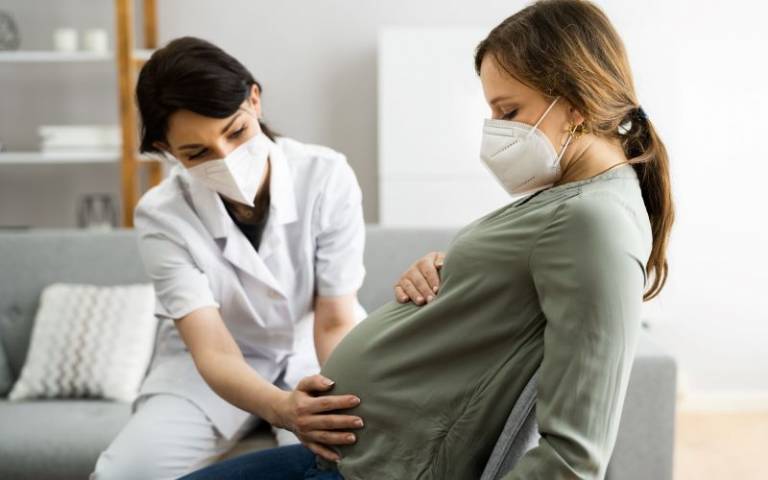Catching Covid-19 in early pregnancy could increase risk of miscarriage
21 June 2022
Pregnant women who reported being infected with Covid-19 in their first trimester were more likely to have an early miscarriage, finds a new study led by UCL researchers.

However, despite the correlation observed in the COVID-19 Contraception and Pregnancy Study (CAP-COVID), researchers say further studies are needed to evaluate any causal association between SARS-CoV-2 infection in early pregnancy and miscarriage risk.
The CAP-COVID study, published in Human Reproduction, asked 3,041 women who were less than 13 weeks pregnant to record their current and past pregnancy complications, their medical history and whether anyone in their household had been diagnosed, or had symptoms of Covid-19, between 21st May and 31st December, 2020.
The results found that the rate of miscarriage amongst women who were presumed to be infected (had received a positive Covid-19 diagnosis) was 14%, compared to 8% in those presumed to be uninfected and 5% in those who were uncertain of whether they had the virus.
After adjusting for age, BMI, ethnicity, smoking status, gestational age and the number of previous miscarriages, the risk of early miscarriage appears to be higher (1.7 times more likely) in the ‘presumed infected’ group.
Co-lead author, Honorary Associate Professor Dimitrios Mavrelos who led the project alongside Honorary Senior Lecturer Ephia Yasmin (both UCL EGA Institute for Women's Health & UCLH Reproductive Medicine Unit), said: “As the Covid-19 epidemic reached pandemic status in mid-2020, little was known about the impact of infection on first trimester pregnancy.
“In order to help answer this question we set up an online survey that ran from late May 2020 to December 2020, asking women in early pregnancy to report whether they had suffered a Covid-19 infection and what the outcome of their pregnancy was.
“Over 3,000 women in the first trimester of their pregnancy registered and provided outcomes. Analysis of our data showed a potential association between Covid-19 infection and miscarriage of pregnancy in the first trimester. This is an important public health finding suggesting that women in early pregnancy may need to be more vigilant with infection prevention measures.”
Previous studies have shown that viral infections during pregnancy such as herpes, HIV-1 and influenza can lead to foetal malformation, preterm labour, growth restriction, stillbirth and spontaneous abortion.
However this study, supported by a grant from the Elizabeth Garrett Anderson Hospital Charity, is the first to investigate the rates of early pregnancy loss during the Covid-19 outbreak to date.
Explaining the potential association between Covid-19 infection and early miscarriage, Honorary Associate Professor Mavrelos said: “Coronaviruses have also been shown to induce a proinflammatory cytokine storm in the body. Cytokines are thought the play a role in the development of recurrent pregnancy loss, which could explain the increased risk of early miscarriage in women infected with Covid-19.
“So, although the sample size of women with presumed Covid-19 in this study was too small to reach statistical significance, the findings still highlight the need for pregnant women to exercise social distancing measures and good hygiene throughout their pregnancy to limit their risk of infection.”
Study limitations
Researchers relied on self-reported data on early pregnancy loss and SARS-CoV-2 infection without any means of checking validity. Some women in the ‘presumed uninfected’ and ‘uncertain’ groups may have had asymptomatic infections. The number of ‘presumed infected’ in our study was low and therefore the study was relatively underpowered.
Links
- Original paper in Human Reproduction
- Honorary Associate Professor Dimitrios Mavrelos
- Honorary Senior Lecturer Ephia Yasmin
- UCL EGA Institute for Women's Health
- UCL Population Health Sciences
- UCLH Reproductive Medicine Unit
Image
Credit: AndreyPopov on iStock
Media contact
Poppy Danby
E: p.danby [at] ucl.ac.uk
 Close
Close

